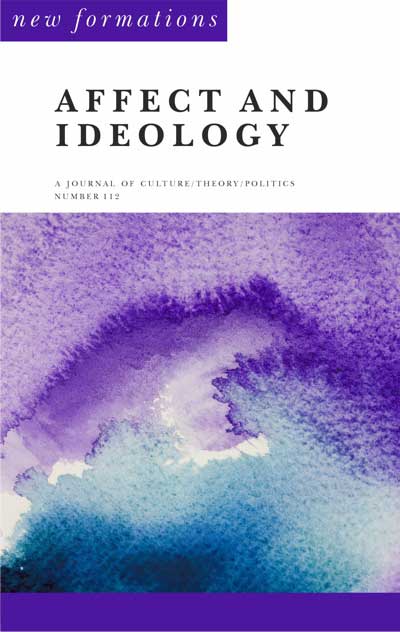
Late-Liberalism and Righteousness: Affective Reflexes and Experiments in Retraining
New Formations - Print ISSN 0950-2378 - Online ISSN 1741-0789
Volume 2024 Number 112
Late-Liberalism and Righteousness: Affective Reflexes and Experiments in Retraining
Helen Graham pages 113‑130
DOI: 10.3898/NewF:112.06.2024
Abstract
Elizabeth Povinelli describes late liberalism as the ‘governance of social difference in the wake of the anticolonial movements and the emergence of new social movements’.1 Taking museums and the impact of the turn towards participatory practice as a focus, I draw on both Povinelli’s ‘cunning of recognition’ and Brian Massumi’s diagnosing of Abraham Lincoln’s phrase ‘of the people, by the people, for the people’2 to understand late liberalism as a loop or circuit where impossible to realise ideals, and ‘part-concept’ tensions create ongoing problematics which require daily negotiation in ways that draw political energy centripetally towards reform.
Righteousness is proposed as an affective reflex – a kind of starter fuel – that works to kick into life the late liberal loop of museum constitution. Reflex – holding the sense of an in-the-moment reaction – is approached through activating two trajectories within theorisations of affect. The first trajectory is that of the relationship between affect, intuition and attachment as developed by Lauren Berlant. The second trajectory explores affect and intensities as taken up in different ways through Lawrence Grossberg and Brian Massumi’s engagements with Deleuze and Guattari.
Methodologically, the article proceeds through specifying a contribution that experimental academic writing might make to conjunctural analysis – working with Patricia Clough’s suggestion that experimental writing offers ‘methods … for cutting out an apparatus of knowing and observation from a single plane … with the aim of eliciting exposure or escaping it, intensifying engagement or lessening it’.3 In particular it is suggested that experimental writing might offer methods not only for generating political analysis, but also for retraining reflexes to enable political interventions. In the case of the righteous reflex of late liberalism it is suggested that retraining might be supported by turning the types of analytical attention offered by attachment and intensities into political techniques of detachment (following Berlant) and modulation (following Massumi). If the changing nature of museum workers’ reflexes can be amplified and then cultivated to suspend the righteous reflex, then different kinds of practice (not defined by inclusion and representation) might be given new space to emerge.
SORRY - you are not registered as being permitted online access to the full text of this article
You have the following options:
- If you are viewing this via an institution or academic library you can ask that your institution takes out a Subscription to this journal.
- If you already have a Personal Subscription please login below
Forgotten your username / password? Click here to locate
- Purchase an annual Personal Subscription
PRINT + DIGITAL personal subscription (£45 / year)
DIGITAL personal subscription (£30 / year)
A Personal Subscription provides immediate access not only to the single article you are seeking, but also to all past and future articles in this journal up to the expiry of your annual (calendar year) subscription. - Purchase immediate access to this single article (UK£7.00) - Buy article Coming Soon
To cite this article
Helen Graham (2024) Late-Liberalism and Righteousness: Affective Reflexes and Experiments in Retraining, New Formations, 2024(112), 113-130 . https://doi.org/10.3898/NewF:112.06.2024
